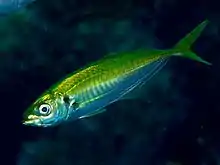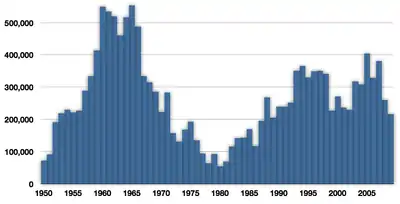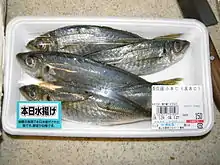Japanese jack mackerel
The Japanese jack mackerel (Trachurus japonicus), also known as the Japanese horse mackerel or Japanese scad, is a species named after its resemblance to mackerel but which is in the family Carangidae, the jacks, pompanos, trevallies and scads.[3] Their maximum reported length is 50 cm (20 in) with a common length of 35 cm (14 in). They have a maximum reported weight of 0.66 kg (1.5 lb) and a maximum reported age of 12 years.[2] They are found around the coast of Japan, apart from Okinawa Island, usually on sandy bottoms of 50–275 m (164–902 ft) deep.[2] They feed mainly on small crustaceans such as copepods, and shrimps and small fish. They are similar to the yellowtail horse mackerel around New Zealand and Australia, apart from having more gill rakers and larger eyes.[4]
| Japanese jack mackerel | |
|---|---|
 | |
| Scientific classification | |
| Kingdom: | Animalia |
| Phylum: | Chordata |
| Class: | Actinopterygii |
| Order: | Carangiformes |
| Family: | Carangidae |
| Genus: | Trachurus |
| Species: | T. japonicus |
| Binomial name | |
| Trachurus japonicus | |
| Synonyms[2] | |
| |
The Japanese name for the horse mackerel is aji (あじ), and by default generally implies the species Trachurus japonicus (which can be more specifically referred to as ma-aji (まあじ), literally "true aji"). The name is most commonly written in hiragana; although a kanji (鯵) does exist, it is not in common use. It is commonly deep fried ("aji furai" あじフライ) or salt-grilled ("shioyaki aji" 塩焼きあじ).
In Korean cuisine, the fish is dubbed jeon-gaeng-i (전갱이) and is the default horse mackerel designated by this name. It is commonly grilled or fried as a jeon-gaeng-i gui (전갱이 구이). Among the specialties of Jeju cuisine is the soup gagjaegi-gug (각재기국), the name of which is derived from the name for the fish in the Jeju language.
Fisheries

The Japanese horse mackerel is important as a commercial fish in Japan, where it is caught using trawls, purse seines, traps and longlines.[4]
References
- Carpenter, K.E.; Jiddawi, N.; Borsa, P.; et al. (2018). "Trachurus japonicus". IUCN Red List of Threatened Species. 2018: e.T20437783A67871570. doi:10.2305/IUCN.UK.2018-2.RLTS.T20437783A67871570.en.
- Froese, Rainer and Pauly, Daniel, eds. (2019). "Trachurus japonicus" in FishBase. August 2019 version.
- "Trachurus japonicus (Temminck and Schlegel, 1844)". Integrated Taxonomic Information System. Retrieved 12 March 2012.
- Trachurus japonicus (Temminck & Schlegel, 1844) FAO, Species Fact Sheet. Retrieved 12 March 2012.



